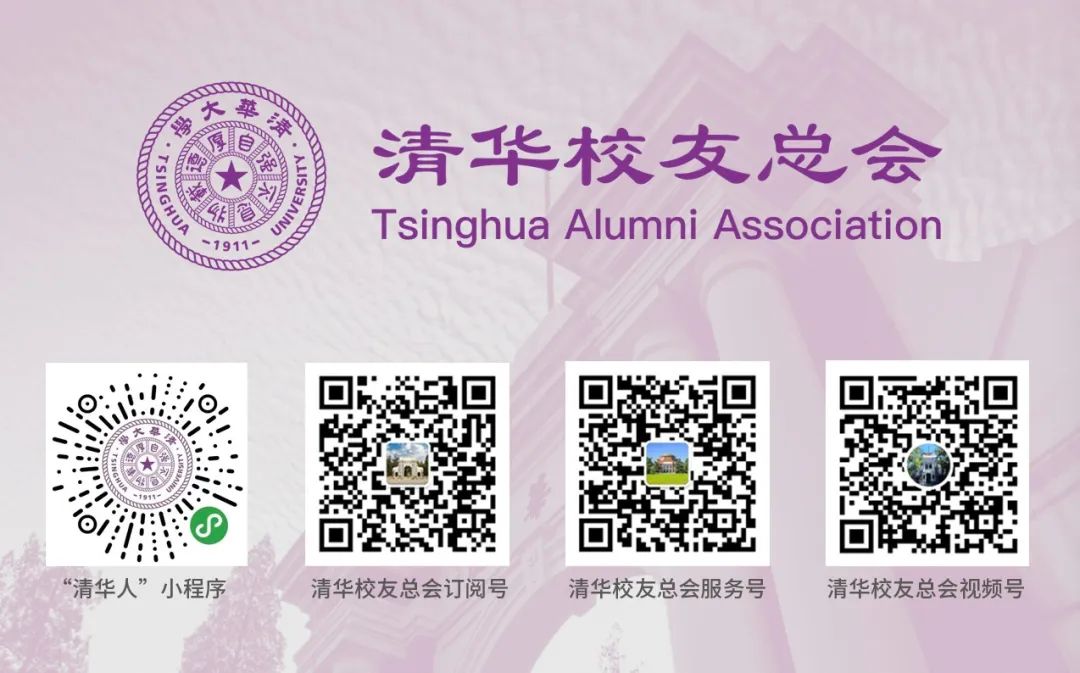
In 1964, I graduated from Beijing No. 1 Girls’ High School. When filling out my college entrance examination preferences, I applied early for “Harbin Military Engineering Institute”. Growing up in a military compound, becoming a soldier had always been my dream. Attending Harbin Military Engineering Institute would allow me to serve my country while learning cutting-edge technology, making it the university I longed for. However, I did not perform well in physics during the entrance exam, and I cried all the way home, thinking I would never get into Harbin Military Engineering Institute!
When the results were announced, I received the admission notice from my first choice, Tsinghua University, becoming the first university student in my family, which brought great joy to everyone! It wasn’t until 2008 that I learned how close I came to missing out on Tsinghua. My elementary school classmate, Yin Yemin, told me that her mother found out that Harbin Military Engineering Institute only admitted 10 girls in Beijing, and both Yin Yemin and I were outside that number. The admissions staff planned to adjust two spots from other regions for us, but they were not entirely sure. Yin Yemin’s mother then told them to release our files to avoid delaying admissions for other schools. This led to Yin Yemin being admitted to Beijing University of Aeronautics and Astronautics (then called) and me being admitted to Tsinghua University. It was her mother’s “brilliant decision” that gave me the opportunity to become a Tsinghua student!
In 1970, when I graduated and was assigned a job, both my parents were at the “May Seventh Cadre School”, and my father was still under investigation. I was considered a “potentially educable child”. One Saturday, a teacher from my department called me in for a talk. She said that I had grown up in a big city and had not experienced much hardship, and that the assigned location was a remote town in Northeast China, with no train service, and I would have to take a sled to get there. I felt I should go to a difficult place for training and expressed my willingness to accept the assignment! However, on Monday, there was a big twist; the teacher spoke to me again, saying that the school leadership believed that some “potentially educable children” should remain at the school, so my assignment was changed to stay at the school. Thus, I, along with over 800 classmates from the 1964 and 1965 classes, became the “New Workers” at Tsinghua University.
Starting in 1988, private enterprises began to emerge in Zhongguancun. An alumnus from my department, who was the founder of a company, invited me several times to join his company. At that time, I felt there were many issues within the system, and we often discussed this topic, but the problems outside the system were even more complex, so I “declined” his invitation.
While I was the party secretary in the computer department, one time, the deputy secretary responsible for organizational work, Huang Shenglun, spoke to me. He said that the municipal Overseas Chinese Affairs Office needed a deputy director and hoped Tsinghua would send a cadre. The school leadership recommended me, and since I was at the department level, I could be promoted one level up. I felt that my personality was not suitable for working in government departments, so I did not go.
This “one entry, three stays” determined my lifelong connection with Tsinghua.
One
After staying at the school in 1970, we were collectively referred to as “New Workers”, meaning we were there to support the older intellectuals in the school. I was assigned to the department workshop and became a real worker.
At that time, Dai Fugeng, Wang Guanghai, and I participated in the prototype production of the “Repetitive Distribution Camera” project at the Xinhua Printing Factory. Our task was to draw the printed circuit board according to the wiring diagram, with each of us working on one board. We applied the skills we learned in engineering drawing class and successfully completed the task.
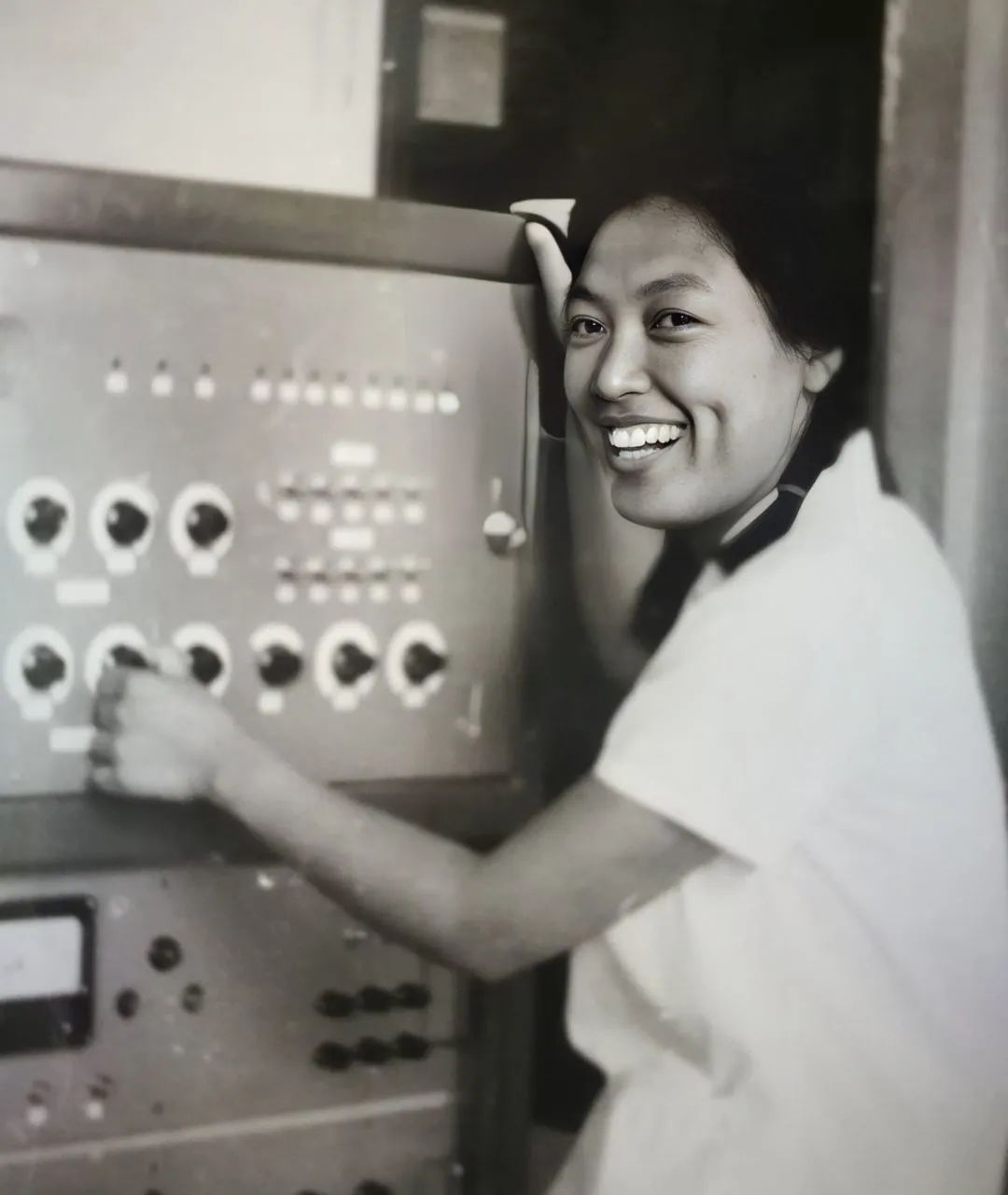 Tuning the Repetitive Distribution Camera
Tuning the Repetitive Distribution Camera
At that time, the work teams from the military and the army were responsible for management at the school, and the military representative always asked me to lead discussions on how to apply Mao Zedong’s thoughts in practice. After a few talks, I expressed to the military representative that I did not want to keep “talking about application”. The military representative looked displeased, and a few days later, it was announced that I would be sent to Liyuzhou Farm in Jiangxi for labor training.
After the “Gang of Four” fell, in 1977, Tsinghua admitted the first batch of students after the Cultural Revolution. I was in the software research group of the computer department, initially serving as a teaching assistant to Professor Lin Xingliang, tutoring the 1977 class in “Assembly Language”. After the 1980 class was admitted, the department decided to strengthen the mathematics foundation for students in the programming major, and the students in Class 0 of the programming major attended “Mathematical Analysis” together with Class 0 of the mathematics major, with Mr. Sun Nianzeng, who was transferred from Peking University, giving the main lectures, and the research group arranged for me to teach the exercise classes for Class 0 students.
This posed a challenge for me, as the “Advanced Mathematics” we studied was primarily computation with few proof problems; however, “Mathematical Analysis” consisted almost entirely of proof problems. Even after previewing and attending the main lectures, I still could not solve the problems. Not wanting to give up, I could only face the difficulties head-on. Therefore, I went to the Xinhua Bookstore in Zhongguancun and bought seven volumes of “Jimmy’s Problem Sets”, solving one problem at a time, often staying up until one or two in the morning. Even so, there were still many difficult problems I could not solve, so I went to my former mathematics teacher, Mr. Wang Zaiyu, for help. Mr. Wang, with a strong Jiangsu accent, patiently explained to me repeatedly, often for an entire afternoon!
For the exercise class preparation, I teamed up with the tutor from Class 0, Hao Fengqi. Hao Fengqi and her husband, Yuan Chuanquan, were both talented students from the mathematics department at Peking University, recommended to Tsinghua by Mr. Hua Luogeng after being transferred. Hao Fengqi was multi-talented, excelling in mathematics and also skilled in cooking and sewing, which impressed me greatly! We often prepared lessons together at her home in Zhaolan Courtyard, while her daughter Yuan Shan and my son played nearby. Once, we were so engrossed in lesson preparation that a thief broke into her home and ransacked the bedroom without us noticing, which shows how focused we were on our work! Fortunately, there was not much valuable stuff at that time, so there was no significant loss. Through persistent effort, I successfully completed my teaching tasks and helped my students develop their abstract thinking skills!
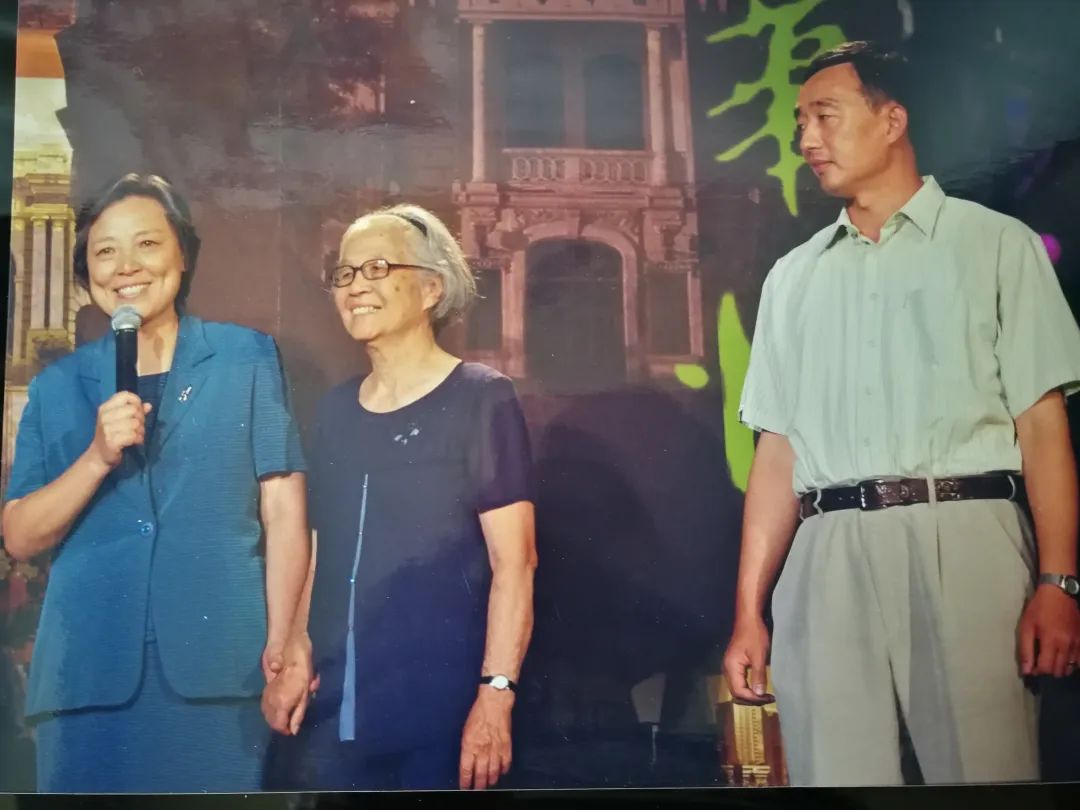 At the 10th anniversary celebration of Tsinghua Science Park, Luo Jianbei with her mathematics teacher Hu Luxi (middle) and student Gong Li (right, then president of SUN China Engineering Research Institute)
At the 10th anniversary celebration of Tsinghua Science Park, Luo Jianbei with her mathematics teacher Hu Luxi (middle) and student Gong Li (right, then president of SUN China Engineering Research Institute)
Two
In 1983, Teacher Zhang Rong from the Organization Department spoke to me, saying that the school had decided to transfer me to the Party Office. I worked in the Party Office from 1983 to 1986, compiling the “Dynamic” under the leadership of Teacher Sun Yinwang. Teacher Sun was a talented writer, and his articles flowed beautifully; he was also very humorous. Under his guidance, my writing and analytical skills improved. Additionally, I served as the recorder for the school party committee and standing committee meetings. During my time in the Party Office, I received the only honor of being named an advanced worker at the school level.
What I remember most is during a summer standing committee meeting, Teacher Li Chuanxin, wearing a tank top (there was no air conditioning at that time), would get so excited while speaking that he would walk around the meeting room, especially when faced with difficult issues, he would walk while rubbing his chest with his right hand, which eventually wore a hole in the chest area of his tank top. Talking to Teacher Li was straightforward; he did not get angry when faced with sharp opinions.
While in the Party Office, I was in contact with the Radio Department and often attended departmental meetings. I learned that some teachers thought Teacher Li Chuanxin was quite serious, so I told him, “You are so ‘serious’ that the teachers don’t dare to greet you when they see you on the road, they can only respect you from a distance!” After hearing this, he smiled and said, ‘Xiao Luo, I accept your opinion!’ After Teacher Li stepped down from his position, some teachers who were reluctant to retire used him as an example. After learning about this situation, I told Teacher Li, “You are a leader and should set an example!” Teacher Li said, ‘Xiao Luo, you are right!’ Teacher Li Chuanxin was upright, open-minded, and had noble character, dedicated to public service; he is a model in my heart!
From 1983 to 1987, I returned to the department as the deputy secretary in charge of student affairs. During the summer of 1987, I led the 1986 class students for a month of military training with the 65th Army, where I served as the deputy commander of the training regiment, with the computer and chemistry departments forming one regiment. At that time, Comrade Qiu Yong was the freshman counselor for the chemistry department and the training company instructor. We experienced the hardships of a month in the field together with the students, building a bond of camaraderie. I was 42 years old that year, wearing a military uniform and insisting on doing morning exercises with the students every day, practicing shooting and marching, which fulfilled my dream of being a soldier!
From 1988 to 1995, I served as the party secretary of the computer department. In 1991, the computer department faced a major issue! A person claiming to be the illegitimate daughter of Taiwan’s Wang Yongqing promised to help import OKI printers from Japan (which were in high demand in Zhongguancun and often out of stock), defrauding the computer factory of 2 million yuan. In the late 1980s and early 1990s, 2 million yuan was an astronomical figure! Even more frightening was that this 2 million yuan was all bank loans, and at that time, the school-run factory was not an independent legal entity. If the bank loans could not be repaid, the bank would freeze Tsinghua University’s accounts! Teacher Tao Sen, who was in charge of finance, spoke to me in the Wugong Hall, saying seriously that given the current situation, to prevent the bank from freezing accounts and affecting the entire operation of Tsinghua, the school decided to declare the computer factory bankrupt and close it.
Upon hearing this, I was overwhelmed. While it was unquestionable to comply with the school’s overall situation, what about the dozens of people in the factory (including teachers, technicians, and workers)? I calmed down and told Teacher Tao, “Can you give me three days? I need to think of a solution!” Back at the department, I worked with the factory staff to check the assets. By checking the accounts, we found that the factory had over 10 million yuan in inventory, but upon inspection, it was mostly outdated electronic components and circuit boards, which were not worth much! However, this accounted asset became our “lifeline”. I told Teacher Tao that the factory was not insolvent (on paper), and we could sign a repayment agreement with the bank, guaranteeing to repay the 2 million yuan within three years! To my surprise, Teacher Tao agreed to our solution, and we obtained the bank’s approval based on this. To fulfill the “military order” I promised, I reluctantly took on the role of factory director and embarked on a three-year “repayment journey” with my colleagues.
The factory leadership explained the severe situation to all employees: facing difficulties without external support, we could only unite and brainstorm for self-rescue! We formulated a three-year repayment plan, centered on the four words “increase revenue and reduce expenditure”! “Increasing revenue” meant extending the product line, promoting sales, and increasing income.
In the early 1990s, foreign computers flooded the market, and the computer factory no longer produced its own designed small computers. Since we had a production license, we decided to increase the assembly of desktop computers, targeting school computer laboratories, and established the logic analyzer developed by teachers such as Shao Xuxian and the computer principle learning machine developed by teachers such as Wang Cheng as the factory’s flagship products, strengthening our sales force. We also attempted to develop more teaching experimental devices created by Tsinghua teachers into products; I had visited teachers such as Cheng Jianping from the Industrial Engineering Department and Zhang Ying from the Automation Department for this purpose. With no money for advertising, we published soft articles introducing our products in education-related newspapers and magazines and increased product visibility by participating in educational instrument exhibitions.
“Reducing expenditure” meant that all employees would not receive overtime pay or bonuses for three years, promoting the spirit of “penny-pinching”! The factory’s party branch, led by Secretary Feng Yibing, played a leading role. Thus, after three years of hard work, we successfully fulfilled our promise and repaid the bank loan!
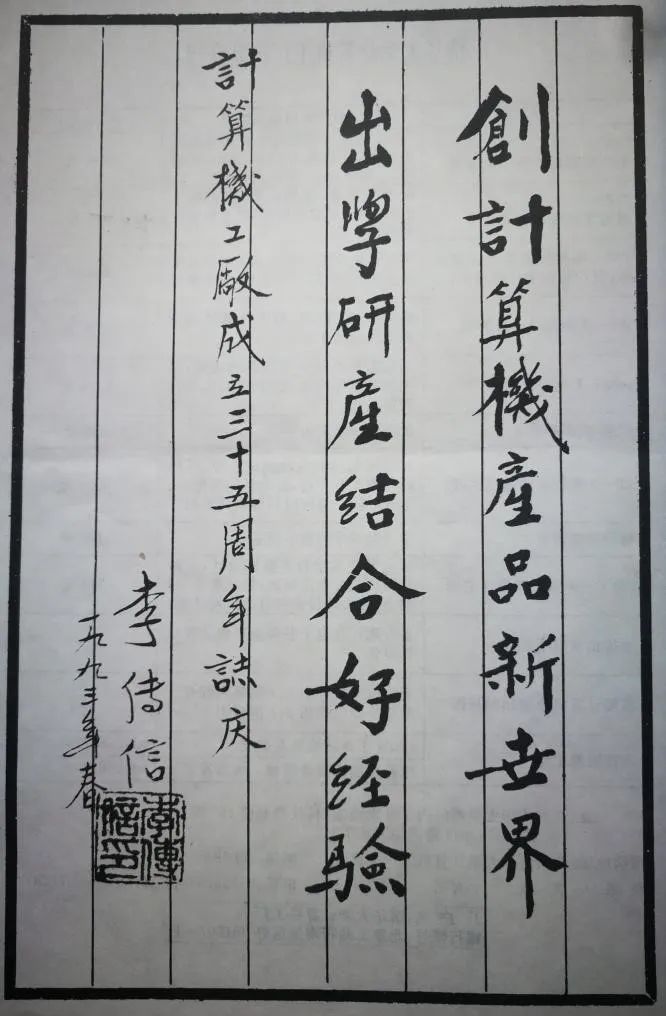 Teacher Li Chuanxin’s inscription for the computer factory
Teacher Li Chuanxin’s inscription for the computer factory
Three
In May 1995, the school leadership transferred me to the Tsinghua Software Technology Development Center (Tsinghua Technology Service Company) to succeed Teacher Ling Ruiji as the director (general manager). The technology service company was the first school-run company approved by then Vice Premier Deng Xiaoping in 1983, a collective enterprise with independent legal status; its main business was foreign data entry and software outsourcing. Under Teacher Ling’s leadership, the company developed year by year, “without internal or external debts”, with all income in foreign currency, making it a prosperous small company.
When I took over this company that had been operating for over a decade, there were no immediate worries, but there were long-term concerns. This outward-oriented company faced issues such as a lack of extensive foreign resources; rising domestic labor costs; decreasing prices offered by foreign clients, especially for data entry; and software outsourcing being order-based services without self-developed products, leading to significant income uncertainty, etc.
My English listening and speaking skills were poor, so I invited classmate Dai Fugeng to join our team. He had studied English in high school and had been a visiting scholar at the University of Edinburgh. Although his pronunciation was not accurate and often made fun of by colleagues, his strength was his willingness to speak, and importantly, foreigners could understand him! He was responsible for the data entry business in the company and quickly adapted to the role.
To address the contradiction between declining income from data entry and rising expenses, we developed a reform plan. The employees in the data department were only seventeen or eighteen years old when they joined, with peak eyesight, brainpower, and physical strength, easily achieving 200,000 keystrokes a day. However, after years of work, sitting in front of the computer every day led to neck and back problems, and some employees even said they felt nauseous upon entering the computer room. The age of thirty-something was really not suitable for data entry work. Therefore, on one hand, we encouraged employees who were not suited for data entry work to buy out their years of service and either transfer to other positions or start their own businesses; on the other hand, we changed the salary model from “salary + bonus” to “base salary + piece rate”, encouraging more work for more pay.
When the plan was announced, the data department erupted in chaos, with all sorts of unpleasant comments. Classmate Dai Fugeng was good at business but was impatient and not very articulate. Faced with a crowd of female colleagues chattering with questions, he became flustered and “misspoke”. I told him, “You are like a Xinjiang girl, with a head full of braids, one handful after another!” Reform had to proceed, and the company’s business could not stop; Dai Fugeng was responsible for business, and I was responsible for implementing the reform measures.
I am confident in achieving the reform goals because this is definitely a win-win plan. I spoke with each employee who had questions about the plan, and as a result, no group incidents affecting the school’s order occurred. Of the more than 70 employees in the data department, over 50 chose to buy out their years of service, receiving compensation ranging from 10,000 to 30,000 yuan each. From then on, the data department began to recruit a large number of workers from rural areas, implementing contract and piecework systems, with the number of employees reaching over 500 at one point. The efficiency and effectiveness of the data department improved! To secure stable orders, we established a subsidiary in the United States and hired American employees and consultants.
In the process of searching for software products, we realized that the valuation of software, patents, and other intangible assets is a new issue in China’s market economy. Professor Chen Xiaoyue from the School of Economics and Management was willing to explore new things, with particularly liberated thoughts and no constraints. He suggested that we establish an intangible asset valuation company, and we found Professor Liu Hongyu from the Civil Engineering Department, and we hit it off. The three units each invested 70,000 yuan to establish an intangible asset valuation company.
The first business the company undertook was to assess the value of the “New Future Electronic Technology Company” founded by four students from the 1984 computer class, guided by Professor Chen Xiaoyue and his master’s student Sun Min. It was this assessment that led to the approval of the proposal to acquire New Future Company by Tsinghua Tongfang Co., Ltd. Before its listing, Tsinghua Tongfang Co., Ltd. paid half in cash and half in stock to the Li Zhu team based on this valuation, and New Future Company was merged into Tsinghua Tongfang Co., Ltd.
Tsinghua Tongfang Co., Ltd. was established on June 21, 1997, through the merger of Tsinghua Artificial Environment Company, Tsinghua Technology Service Company, and three other companies, and was listed on the Shanghai Stock Exchange on June 27 of the same year, with stock code 600100. I participated in the entire process of the company’s listing, from guidance before the listing, stock issuance preparation, establishment of the joint-stock company, to the listing itself. Experiencing the listing of Tsinghua Tongfang Co., Ltd. gave me a firsthand understanding of how the capital market can assist in company development.
Four
In early 1999, the school transferred me to the Tsinghua Science Park Development Center, where I served as the deputy director. When I was at the technology service company, I had interacted with the Science Park Development Center. At that time, Director Mei Meng approached me, saying that the center’s office was moving from Shengyin Courtyard to Ziguang Building and urgently needed funds for renovation. Since the Science Park was a school project and I trusted Director Mei Meng, we lent 300,000 yuan to solve the urgent need of the Science Park. Perhaps this was my fate with the Science Park! However, I had no idea what the Science Park was about at that time.
After joining the Science Park, I gradually began to understand it. At this time, the functional positioning of Tsinghua Science Park had evolved from its initial role of promoting the transformation of school scientific and technological achievements, achieving functional zoning of the school (an article in the 1993 “Reference News” once stated that opening the door of a research room at Tsinghua University was like entering a company), and improving the surrounding environment of the school, to gradually clarifying three major functions:promoting the transformation of university scientific and technological achievements, incubating high-tech enterprises, and cultivating entrepreneurial talents.
Regarding the transformation of scientific and technological achievements, senior Ji Fusheng once said something very ironic: the scientific achievement appraisal meetings in universities are like “funeral services”. This shows how severe the situation is for promoting the transformation of university scientific and technological achievements (mainly referring to the results of vertical research projects)! How to prevent the results developed with significant national investment and the hard work of teachers from being shelved is the problem we need to solve. Deng Xiaoping said that science and technology is the primary productive force! However, if applied technologies cannot be transformed into products, they cannot become the primary productive force! The Tsinghua Science Park team participated in a research project on the transformation of scientific and technological achievements led by Director Zhao Mulan in Zhongguancun. As we delved deeper, we discovered that the transformation of scientific and technological achievements is a global challenge!
The funding investment from research and development to prototype production, from prototype to product, and from product to commodity is in a ratio of 1:10:100, while the funding investment from prototype to product is the “valley of death” for the transformation of scientific and technological achievements. The key to crossing the “valley of death” is significant funding investment, requiring various personnel familiar with productization to join in to solve practical issues such as production processes, practicality, durability, and maintainability. The first stage of investment is often project funding from relevant government departments, while by the third stage, the product risk is largely released, and larger funds become interested in mass production. The second stage carries the highest risk, primarily because it cannot secure funding, hence it is called the “valley of death”. Referring to the successful case of the container detection system from the Industrial Engineering Department, it is clearer to see that without the funds raised from the listing of Tongfang to meet the needs of the Tianjin port demonstration project, the transformation from laboratory prototype to product would not have been possible. At that time, the transformation rate of scientific and technological achievements in China was less than 5%, while that of universities in the United States reached over 50%. We studied and researched the mechanisms of scientific and technological achievement transformation in European and American universities and wrote “Opinions and Suggestions on Promoting the Transformation of Scientific and Technological Achievements” to Vice President Gong Ke and the Technology Development Department.
To incubate high-tech enterprises and cultivate entrepreneurial talents, in the extreme lack of funds, on August 20, 1999, we established the Tsinghua Entrepreneurship Park on the 10th floor of the Academic Research Building A. I took the initiative to ask Director Mei Meng to serve as the director of the Tsinghua Entrepreneurship Park.
The Tsinghua Entrepreneurship Park faced survival issues from its inception. Unlike government entrepreneurship centers, which have financial allocations to maintain daily operations, the Tsinghua Entrepreneurship Park had none. We designed the Tsinghua Entrepreneurship Park as an office space where entrepreneurs could move in with just their bags, but at that time, the Tsinghua Science Park could not provide funds for renovation and office equipment. We first approached our alumnus Ma Lin, then director of the Haidian Park in Zhongguancun, to report our park establishment plan and difficulties, and the Haidian Park decided to fund us 750,000 yuan.
We also approached the Construction Bank, which had always supported the construction of the Science Park, hoping to establish a cooperative relationship with the Tsinghua Entrepreneurship Park and sponsor the newly established park with 500,000 yuan to carry out activities for enterprises. In the future, many companies would enter the Tsinghua Entrepreneurship Park, and we would suggest that they open accounts at the Construction Bank, and these high-tech companies would go through rounds of financing, even going public, bringing significant funds to the bank (at that time, attracting deposits was a big deal). Our description impressed them, but the bank had never done such a thing. After the branch leadership reported to the higher-ups, it was finally approved, and we received 500,000 yuan in sponsorship from the bank.
These funds could only solve immediate financial needs; how to achieve sustainable development (forming positive cash flow or even profitability) for the Tsinghua Entrepreneurship Park remained a problem to be solved. We tried various revenue models, such as agency services, consulting fees, and converting rent reductions into equity stakes, but all were difficult to implement. During the service process, we found that start-ups, especially high-tech companies, go through a process of converting mature technologies into products, namely the transformation of scientific and technological achievements. At this stage, companies have no income, and when the initial funds run out, they face bankruptcy, encountering the “valley of death”; moreover, small companies lack collateral, orders, and creditworthiness, making it impossible to secure debt financing. Therefore, angel investment and equity investment during the seed stage became essential for them. Under the leadership of Director Mei Meng, Tsinghua Entrepreneurship Park initiated the development model of “incubation + seed-stage investment”.The seed-stage investment amount is not large; I describe it as “a bowl of water” poured onto a “seedling” of a start-up, which is the lifeblood. Early investments are made in people (the entrepreneurs), and the incubator, through close contact, knows their character, team, and other situations best, thus reducing investment risks.
In early 2000, Zheng Haitao and three classmates from the 1984 Automation Department founded Digital Video Technology Company and moved into the Tsinghua Entrepreneurship Park. The company had a registered capital of 1 million yuan and developed products for digital television front-end devices. By early 2001, the company’s initial funds were exhausted, coinciding with the burst of the internet bubble and a sudden cooling of the capital market. Based on our understanding of Zheng Haitao and his team, we quickly decided to invest 500,000 yuan in Digital Video Technology at its most difficult time, which also attracted an angel investor. With this funding, the company obtained the network access certificate for its products and began small-scale production. In October, funds ran out again, and the company underwent a second round of financing, with the Tsinghua Entrepreneurship Park following up with another investment. From then on, Digital Video Technology entered a fast track of development, achieving profits of over 7 million yuan in 2002. From 2003 to 2004, the company first faced the impact of SARS on sales, followed by turmoil due to the departure of two founders; coupled with the expansion of the company’s scale, it suddenly faced a severe cash flow crisis, with monthly expenses of 1.5 million yuan but only 140,000 yuan in the account; to make matters worse, old loans were due, and new loans had not yet arrived. At the critical moment for Digital Video Technology, the Tsinghua Entrepreneurship Park provided a third round of investment. “Ten years of sharpening a sword”, in 2010, Digital Video Technology was listed on the Growth Enterprise Market, and Zheng Haitao realized his dream of building a strong company, and the investment from Tsinghua Entrepreneurship Park also yielded substantial returns, which may be the power of compound interest in investment!
On January 21, 2015, at the invitation of Kunlun Wanwei CEO Zhou Yahui, I attended the bell-ringing ceremony for Kunlun Wanwei’s listing at the Shenzhen Stock Exchange. In 2001, Chen Changjiang from the Precision Instrument Department and Zhou Yahui founded “Suiren Information Technology Company”, a name that sounds very Chinese! At that time, NetEase decided to acquire their company. They were worried that their development would be restricted after the acquisition and did not agree. The two brothers founded a company that made animation websites, and their dream was to create animations based on traditional Chinese culture, breaking the dominance of American and Japanese animations, which was very touching! Tsinghua Entrepreneurship Park invested 500,000 yuan in Suiren Company based on NetEase’s offer. Zhou Yahui later left this company and, after several years, founded Kunlun Wanwei in 2012. I told Zhou Yahui that Tsinghua Science Park’s investment in Suiren Company, although it did not yield returns at that time, contributed to the cultivation of an entrepreneur, which is a contribution to the country and is very worthwhile. At the bell-ringing ceremony, Zhou Yahui gave a two-minute speech. In his speech, he suddenly went off-script, thanking his alma mater Tsinghua University and me, saying that 15 years ago, I gave him his first venture capital investment. The 500,000 yuan that I represented Tsinghua Science Park invested in him had not returned to the school for various reasons, but today he promised to donate 100 million yuan to Tsinghua University in the next three to five years. I was moved to tears! Grateful and remembering kindness! What a wonderful child!
Zhaoyi Innovation is a returnee company that started in Tsinghua Science Park, focusing on the technology and product development of memory chips. In 2004, Zhu Yiming and Shu Qingming developed a new type of memory chip in the United States and felt that China should also have its own memory chips. They returned to China to start a business in 2005. When they moved into the Tsinghua Science Park for returnee entrepreneurs, the company was called Xinjijiayi, targeting South Korea’s Samsung Electronics. Zhu Yiming always described their memory products as the “rice” in computers, emphasizing their importance. They faced competition from large foreign companies; in 2007, Samsung drastically reduced prices, implementing the “counter-cyclical law”, and in 2008, they encountered the financial crisis, putting Xinjijia in a difficult position. Since entering the park, Xinjijia had received our close attention. To reduce design costs, we established a partnership with the Zhongguancun Microelectronics Park, allowing Xinjijia to rent their chip automatic design tools; the Science Park participated in two rounds of financing for Xinjijia to support its development. The American company ISSI once wanted to invest 10 million dollars to acquire the company, but Zhu Yiming and his team firmly rejected it. Xinjijia changed its name to Zhaoyi Innovation and was listed on the main board in 2016, with its stock price rising sharply within six months. By 2018, Zhaoyi Innovation’s NOR Flash had captured 8% of the global market, ranking third in the world!
On April 13, 2021, just before the 110th anniversary of my alma mater, Zhu Yiming, Shu Qingming, and six other Tsinghua alumni donated to Tsinghua University to establish the Zhaoyi Innovation Basic Discipline Construction Fund. During the donation ceremony, Zhu Yiming mentioned: “When Shu Qingming and I visited Teacher Luo in suits, we respectfully said that Teacher Luo told us, ‘You cannot be a flower bud in a greenhouse when entering Tsinghua Entrepreneurship Park.’ I have always remembered that. I want to say, they are really not flower buds in a greenhouse, but rather beautiful flowers blooming in the storm of the market economy!
Since its establishment, Tsinghua Entrepreneurship Park has received numerous awards and honors, gaining a certain reputation in Zhongguancun, universities, and the industry nationwide. The reasons for achieving such results are first, the endorsement of Tsinghua University; second, we have caught up with the good era of reform and opening up; and third, we have indeed worked hard. The most gratitude should go to these entrepreneurs; without them, we would have achieved nothing.
Starting a company is not easy! Zheng Haitao shared his entrepreneurial insights with students at the School of Economics and Management, saying that before starting a business, one must be mentally prepared for three aspects: first, you may be left with nothing; second, you may face family breakdown; and third, you may experience mental breakdown! What he said is not an exaggeration; we have indeed witnessed the difficulties faced by entrepreneurs in the entrepreneurship park. If it were just for making money, Tsinghua students would not need to start businesses; the risks are too high! It should be said that most people determined to start a business have an unsettled heart and want to achieve something. If pursuing financial freedom, Zhu Yiming’s current wealth is more than enough. However, in 2018, Zhu Yiming resigned as CEO of Zhaoyi Innovation (retaining the position of chairman) and began his second entrepreneurial venture as CEO of Hefei Changxin Storage, tackling the more challenging NAND Flash memory chips, aiming to promote the accelerated development of China’s memory chips. In 2021, he spoke at the GSA Global Storage Summit on the topic “Smart Infrastructure Realizing the Vision of a Better Life for Humanity”; he is a person who wants to change the world! On the homepage of the Tsinghua Entrepreneurship Park website back then, it was written: “There is a group of people in the world for whom entrepreneurship is a ‘sentiment’, and entrepreneurship is a ‘mission’. Therefore, no matter how difficult it is, they can face it with joy. Only in this way can they feel that their lives are not in vain.” This is our interpretation of entrepreneurs!
At the end of 1999, a report in the Beijing Evening News likened Tsinghua Entrepreneurship Park to the “Huangpu Military Academy” for cultivating entrepreneurs. For the newly established Tsinghua Entrepreneurship Park, this evaluation was indeed too high! However, this evaluation inspired us, motivating us to work harder towards this goal, determined to cultivate the true entrepreneurs that the country needs. Over the past 20 years, Tsinghua Entrepreneurship Park has received many honors, and the children in the entrepreneurship park affectionately call me ‘Aunt Luo’, which is the highest praise for me! I am keenly aware that it is their courage to start businesses that has made our incubation investment career successful! Being with these entrepreneurs, you can always be inspired and moved by their passion! From these entrepreneurs, we can see the future of our country! Therefore, I firmly believe in China! I am convinced that the younger generation will surpass the older generation, and each generation will be stronger than the last!
Looking back on my 39 years at Tsinghua, we, the “New Workers”, are indeed very fortunate! Although the Cultural Revolution delayed ten years of our youth, the school cultivated our ability to learn, recognize problems, and solve problems. We have unreservedly devoted ourselves to the tide of reform and opening up, while also enjoying the dividends of reform and opening up! Thanks to the cultivation, trust, and employment from my alma mater, I have been a teacher, worked in management and business, operated enterprises, engaged in enterprise incubation and venture capital, and worked hard on the platform provided by my alma mater to bring glory to it. We, the “New Workers”, have reached the age of “approaching eighty”, but there is still room for improvement. We must continue to learn new things and knowledge, keep pace with the times, and contribute to society as much as we can!
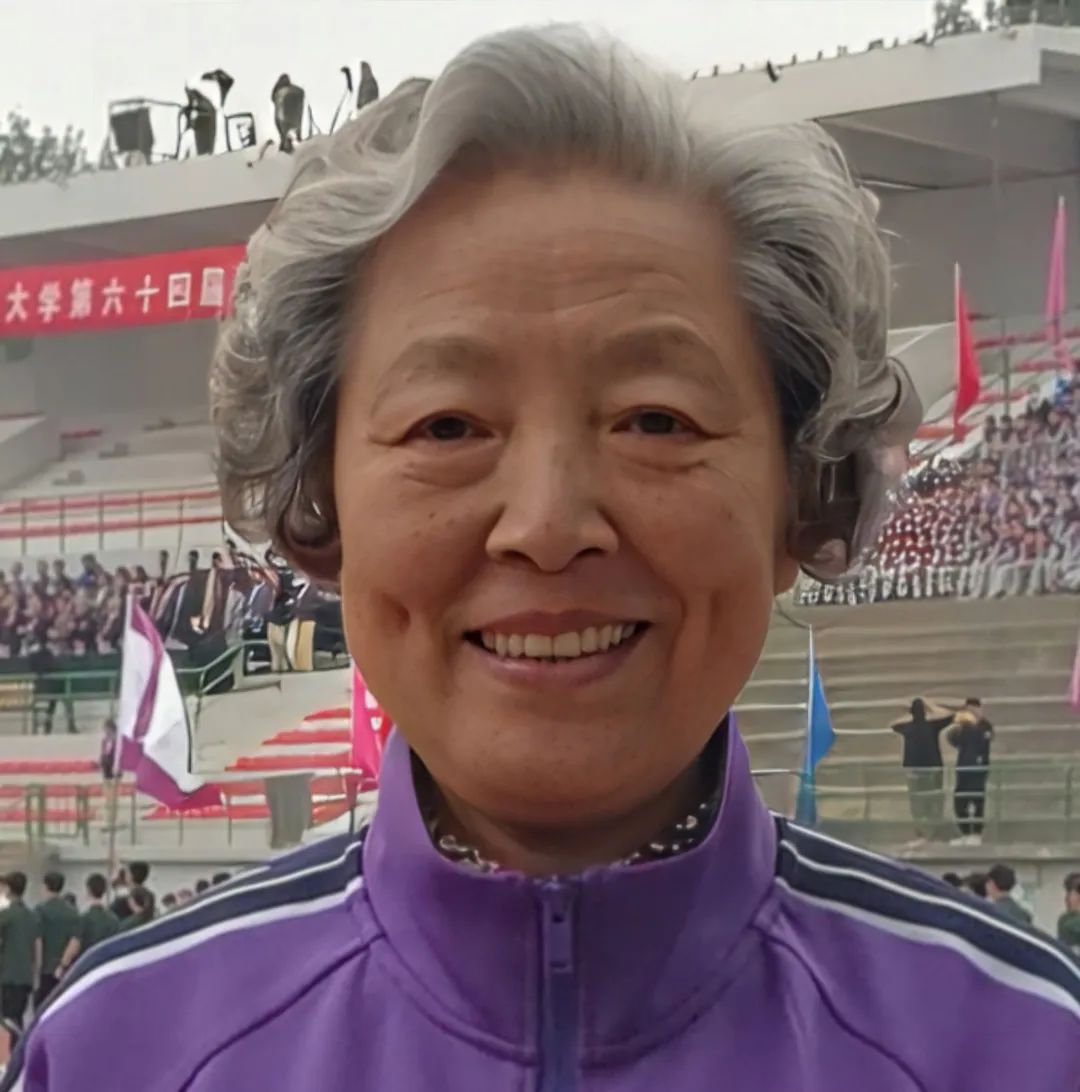
About the Author
Luo Jianbei, researcher. An alumnus of the 1964 class of the Department of Automatic Control at Tsinghua University, she stayed at the school after graduating in 1970, engaging in teaching and research work. She has served as the party secretary of the computer department, director of the Tsinghua University Software Technology Center (general manager of the technology service company), director and executive vice president of Tsinghua Tongfang Co., Ltd., deputy director of the Tsinghua Science Park Development Center, and director of the Tsinghua Entrepreneurship Park.

On the 75th anniversary of the founding of New China,
the Alumni Association has specially planned
the “Report to the Motherland” series of reports.
In the torrent of the times,
Tsinghua people are steadfastly striving in their respective positions,
always moving forward with the motherland.
Action is the best expression.
Report to the motherland,
Tsinghua people are ready!
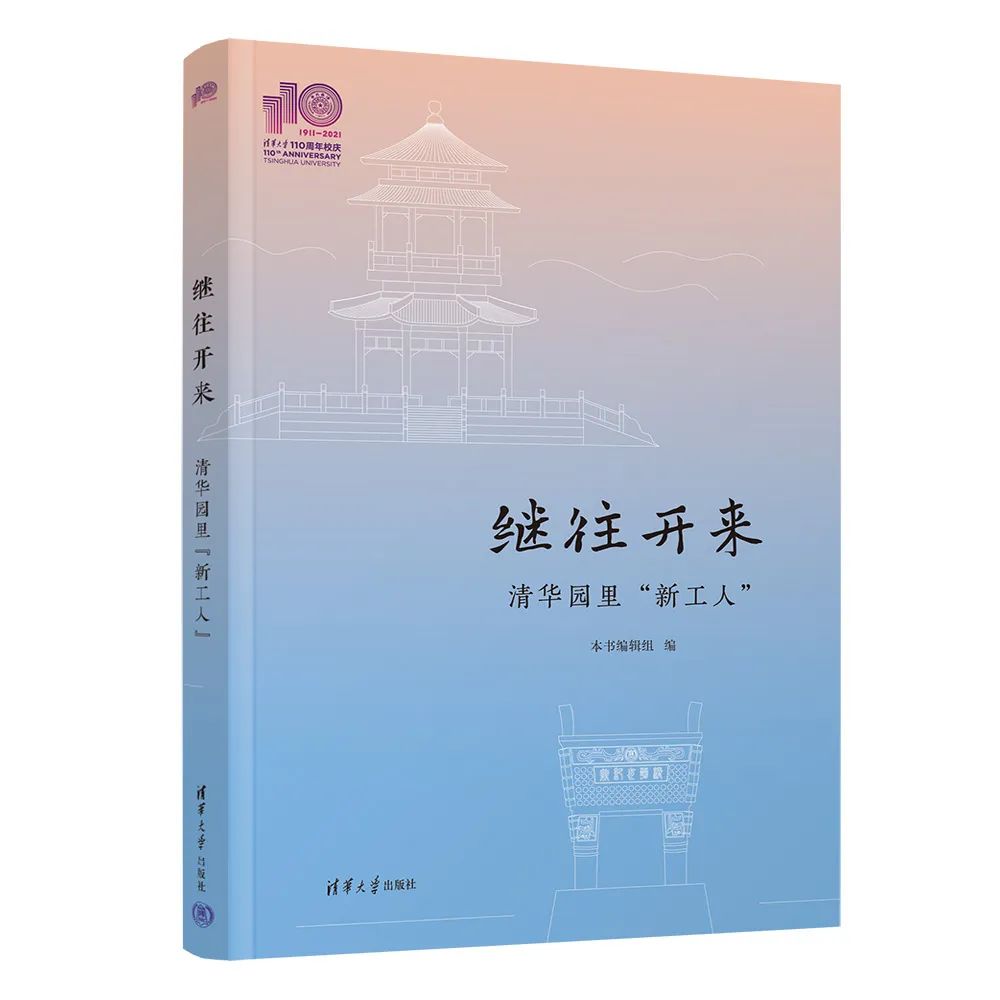
This article is excerpted from “Continuing the Past and Opening the Future – ‘New Workers’ in Tsinghua Garden”Tsinghua University Press, December 2022Editorial team members: Zhuang Lijun, Bai Yongyi, Tian Qian, Sun Zhe, Huang Wenhui, Feng YinRecommended Reading
-
The 2024 Tsinghua Alumni “May John” Cup Sports Meeting is here!
-
He is willing to exchange “entering the mountains” for your “coming out of the mountains”!
- Farewell! The cyclist who broke the national record the most in Tsinghua’s history has passed away…
